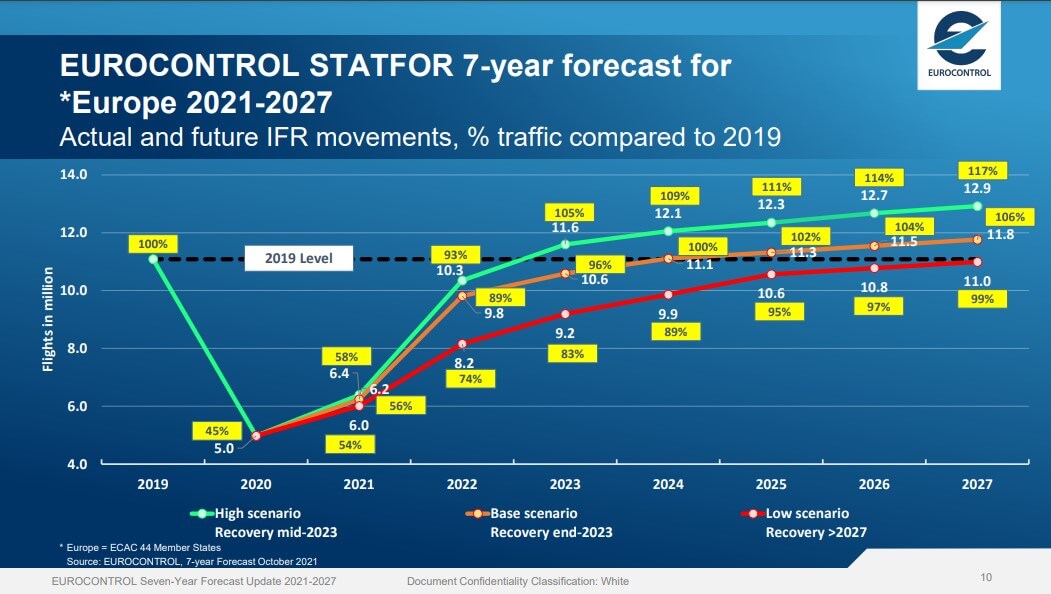Could European air traffic recover sooner than expected? That’s what network manager Eurocontrol is predicting, following what it describes as an “encouraging” summer.
Eurocontrol, which helps to coordinate air traffic flows across Europe, has published three scenarios as to how it anticipates traffic will recover following the COVID-19 pandemic – low, baseline and high.
In an October 15, 2021 update to its forecasts, Eurcocontrol said that both its baseline and high scenarios now show a recovery to 2019 levels of traffic during the course of 2023. In the low scenario, recovery is delayed until 2027. The high scenario is based on continuing vaccination rollout, easing of travel restrictions and quick recovery of business travel. The baseline scenario is similar, but with traffic flows outside Europe and business travel recovering more slowly.
Source: Eurocontrol
It had previously predicted on May 21, 2021 that, under its best-case scenario, traffic would recover to 2019 levels only by 2024, while the baseline scenario was for a recovery to 95% of pre-pandemic levels in 2024.
However, the network manager has now updated its predictions after a promising summer for European travel demand. Traffic for holiday destinations also remains strong even after the end of the summer and the positive trends are set to continue for the December holiday period, Eurocontrol said.
“Last year we had only five million flights but this summer has been very encouraging, with traffic close to our previous ‘high’ scenario and to airline expectations,” Eurocontrol Director General Eamonn Brennan commented in the October 15, 2021 press release.
Current monthly data shows traffic since August 2021 has been at around 70-72% of 2019 levels. This is in line with Eurocontrol’s previous best-case scenario, which was based on widespread vaccine take-up.
Even after the end of the summer, we’re seeing strong traffic numbers in holiday destinations Turkey (12% down on 2019) and Greece (just 4% down) @Transport_EU @IATA @A4Europe @CANSOEurope @dhmikurumsal @ATH_airport @igairport @ACI_EUROPE pic.twitter.com/NPp0xZqQjL
— Eamonn Brennan (@eurocontrolDG) October 16, 2021
Eurocontrol now expects approximately 6.2 million flights in 2021 among the 44 member states of the European Civil Aviation Conference, 44% down on 2019 levels.
“We are optimistic about traffic recovering to 2019 levels earlier than anticipated, with the baseline scenario indicating 9.8 million flights in 2022, just 11% down on 2019,” Brennan added. “But we must be aware that there are still significant downside risks that could affect the recovery.”
Eurocontrol notes, however, that its data is for flights, not passenger numbers, stating: “Recent experience has been that the recovery in the number of passengers is lagging behind the increase in the number of flights”.
The downsides Brennan mentioned include a fragile economic recovery, plus rising oil and fuel prices, which Delta has already cited as a risk to its profits in the final months of the year.


